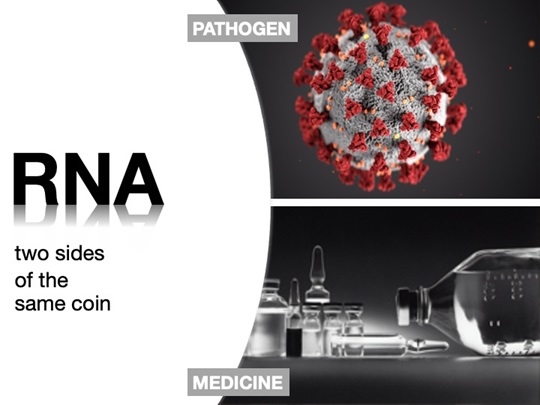Shared Content Block:
Styles -- retool bulleted and numbered lists, add "spaced-out" class
About the RNA Bioscience Initiative
History of the RBI
The RNA Bioscience Initiative was started in January 2016 with $20 million in funding from the Dean’s Office of the University of Colorado Anschutz School of Medicine. The program’s first director, Richard Davis, PhD, in collaboration with then associate directors (current co-directors) David Bentley, PhD and Jay Hesselberth, PhD, quickly established a system of support and programming to expand RNA-focused research on the CU Anschutz campus. In addition, they recruited five new faculty– all young, rising stars in the field of RNA biology; and reconnected to the RNA community at CU Boulder, which includes foundational RNA researchers Thomas Cech (Nobel Prize, 1989), Roy Parker (HHMI Investigator, Director BioFrontiers Institute) and many others. These first moves re-energized local and regional interest in RNA biology and lead to the establishment of the RBI as a nationally recognized, cutting-edge hub for RNA research.
Objectives of the RBI
- Engage in collaborative, multidisciplinary, cutting-edge RNA research
- Train the next generation of RNA researchers
- Develop a strong RNA-focused community that includes a broad spectrum of participants
- Leverage existing local and regional strengths in RNA research to expand RBI programming and public outreach
- Establish academic-corporate partnerships to accelerate translation of discoveries in basic RNA biology to clinically useful diagnostics and therapeutics
Return on Investment in the RBI
Since its inception in January 2016 the RBI has:
- Nearly tripled in size, growing from 33 faculty members to 92+ faculty members (and their affiliated labs)
- Supported the publication of 157+ research articles
- Invested in 137+ RNA-focused pilot research projects
- Enhanced training in RNA biology, awarding 25 RBI RNA Scholars fellowships and 84+ RBI Summer Internships
- Established the RBI Bioinformatics Fellows, a unique team that both develops and disseminates informatics knowledge and software critical to analyses of the large data sets inherent to nucleic acids research
- Hosted or co-hosted a variety of community-building events, including the highly successful Rocky Mountain RNA Symposium
How does RNA research impact your life? Why is it important? What you can do?
 2020 was a challenging and scary year for most of the 7.8 billion people on planet earth—and for many, the words Ribonucleic Acid or RNA suddenly became very important
and extremely relevant to their daily lives. In late 2019 a novel RNA virus, SARS-CoV-2, emerged as a deadly human pathogen that rapidly spread worldwide, shuttering economies, straining health care systems, sickening tens of millions, and killing
millions.
2020 was a challenging and scary year for most of the 7.8 billion people on planet earth—and for many, the words Ribonucleic Acid or RNA suddenly became very important
and extremely relevant to their daily lives. In late 2019 a novel RNA virus, SARS-CoV-2, emerged as a deadly human pathogen that rapidly spread worldwide, shuttering economies, straining health care systems, sickening tens of millions, and killing
millions.
Fortunately, in mid-December 2020, RNA made front-page news once again… this time emerging as a protector rather than a villain. This protection came in the form of the mRNA-based vaccines developed and produced by Pfizer-BioNTech (95% efficacy) and Moderna-NIH (94% efficacy), respectively.
These vaccines reached the clinic at recording-breaking speed, approximately 11 months from inception to approval, yet represent YEARS of hard work by RNA researchers around the world.
RNA biology has emerged as one of the most influential areas in modern biology and clinical science. The discovery of numerous new classes of RNAs and their function in a wide spectrum of biological processes has revolutionized molecular biology and has profound implications for the future of clinically relevant diagnostics and therapeutics.
Unfortunately, major knowledge gaps limit our full understanding of RNA biology. Much remains to be uncovered about RNA and the vast and complicated ways it regulates cellular biology and disease. Key areas of research that demand new and sustained funding include elucidation of RNA biogenesis and structure, identification of RNA subclasses and their function, determination of the role of RNA in disease, and development of the technology and computational expertise needed to translate “wet lab” innovations to the bedside.